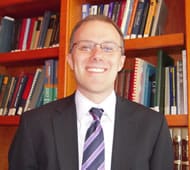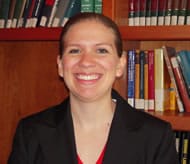About
13 July 2011
OSA, SPIE and MRS Announce 2011-2012 Congressional Science and Engineering Fellows
FOR IMMEDIATE RELEASE
Contact:
Lyndsay Meyer
The Optical Society
+1.202.416.1435
lmeyer@osa.org
Amy Nelson
SPIE
+1 360 685 5478
amy@spie.org
Sandra DeVincent Wolf
Materials Research Society
+1.724.779.2731
swolf@mrs.org
OSA, SPIE and MRS Announce 2011-2012 Congressional Science and Engineering Fellows
 |
|
Anthony Augustine, Arthur H. Guenther Congressional Fellow |
 |
| Laura Povlich, OSA/MRS Congressional Fellow |
WASHINGTON, July 13 —The Optical Society (OSA), along with co-sponsors SPIE, the international society for optics and photonics, and the Materials Research Society (MRS), have selected their 2011-2012 Congressional Science and Engineering Fellows. Anthony Augustine, a recent graduate of Stanford University, will serve as the Arthur H. Guenther Congressional Fellow (co-sponsored by OSA and SPIE) and Laura Povlich, a recent graduate of the University of Michigan, will serve as the OSA/MRS Congressional Fellow. Augustine and Povlich will each serve one-year terms working as special legislative assistants on the staffs of members of Congress or congressional committees.
Augustine and Povlich will begin the program in early September in Washington, D.C. starting with an intensive orientation facilitated by AAAS for Congressional and Executive Branch Fellows from more than two dozen scientific societies. Following orientation, the new Fellows will go through an interview and selection process with offices of senators, representatives or committees on Capitol Hill. Offices will extend offers, and Augustine and Povlich will each choose the office in which they will spend their fellowship year.
“The knowledge and expertise that scientists are able to offer on Capitol Hill is truly invaluable,” said Greg Quarles, OSA Public Policy committee chair. “The fellowship program offers a unique and exciting way for scientists to become involved with public policy while making meaningful contributions to the legislative process. I am confident that both Anthony and Laura will excel in their roles as Congressional Fellows.”
The purpose of the Congressional Fellowships program is to bring technical and scientific backgrounds and external perspectives to the decision-making process in Congress. Typically, fellows conduct legislative or oversight work, assist in congressional hearings and debates, prepare briefs and write speeches as a part of their daily responsibilities. By applying their scientific expertise in this policy environment, Augustine and Povlich will help to broaden awareness of the value of scientist- and engineer-government interaction.
Each year, following a formal application process, finalists are interviewed and fellows are selected by committees comprised of volunteer members from OSA, SPIE and MRS. For more information on the selection process, visit the SPIE website, the MRS website or OSA’s website.
About the Guenther and OSA/MRS Fellows
Anthony "T.J." Augustine most recently completed his master’s degree in public policy at Stanford University. As a public policy student, he worked with a team to publish a report on sovereign fiscal responsibility in the United States and around the world. He also helped develop and implement a new concentration in science and technology policy within the Stanford Public Policy Program.
While he had an interest in government from an early age, he chose to major in chemistry as an undergrad at the University of Illinois. In 2003, he received a B.S. in chemistry with Highest Distinction and was honored as the recipient of the Bailer Award for most outstanding senior thesis. After college, he completed his Ph.D. in chemistry at Stanford University. His research there involved using various spectroscopic methods to study the mechanism of dioxygen reduction to water by the multicopper oxidase family of enzymes. This work has application to diseases involving copper metabolism and in the development of more efficient fuel cells.
As a graduate student in chemistry, he published a number of peer-reviewed articles and presented his work at multiple national conferences. While working on his master's, Augustine worked as an intern at the White House Office of Science and Technology Policy. In this position, he performed policy analysis and assisted in the preparation of reports by the President's Council of Advisors on Science and Technology, working on issues including energy; science, technology, engineering, and math education; biodiversity and ecosystem sustainability; and advanced manufacturing.
Moving forward, Augustine is particularly interested in working on energy technology, industrial competitiveness, and national security issues. He believes these topics are closely linked and will play a critical role in determining America's future standing in an increasingly uncertain and challenging world.
Laura Povlich earned her Ph.D. in macromolecular science and engineering at the University of Michigan, Ann Arbor in 2011 as a Rackham Merit Fellow and an NIDCR Tissue Engineering and Regeneration Training Grant recipient. Her thesis work involved the development of new conducting polymers to interface neural prosthetic devices with nervous tissue. In 2009, Povlich moved to the University of Delaware and finished her Ph.D. research as a visiting scholar. In 2006 Povlich received her B.S.E. in materials science and engineering from the University of Michigan, where she first began her research career as a freshman through the Undergraduate Research Opportunity Program.
Povlich’s interest in science policy began in graduate school at Michigan and while researching in Delaware. While attending the “Science Outside the Lab” program through the Consortium for Science, Policy and Outcomes at Arizona State University, Povlich was able to learn about the wide variety of organizations involved in forming and implementing science policies, solidifying her desire to pursue a policy career. Povlich’s interests in policy include education, healthcare, science, and the funding of developing technologies.
About OSA
Uniting more than 106,000 professionals from 134 countries, the Optical Society (OSA) brings together the global optics community through its programs and initiatives. Since 1916 OSA has worked to advance the common interests of the field, providing educational resources to the scientists, engineers and business leaders who work in the field by promoting the science of light and the advanced technologies made possible by optics and photonics. OSA publications, events, technical groups and programs foster optics knowledge and scientific collaboration among all those with an interest in optics and photonics. For more information, visit www.osa.org.
About the Materials Research Society
MRS is an international organization of almost 16,000 materials researchers from academia, industry and government, and a recognized leader in promoting the advancement of interdisciplinary materials research to improve the quality of life. MRS members are engaged and enthusiastic professionals hailing from physics, chemistry, biology, mathematics and engineering—the full spectrum of materials research. Headquartered in Warrendale, Pennsylvania (USA), MRS membership now spans over 80 countries, with more than 40% of members residing outside the United States. In addition to its communications and publications portfolio, MRS organizes high-quality scientific meetings, attracting over 13,000 attendees annually and facilitating interactions among a wide range of experts from the cutting edge of the global materials community. MRS is also a recognized leader in education outreach and advocacy for scientific research. More information about the Materials Research Society can be found on its Web site, www.mrs.org.
About SPIE
SPIE, the international society for optics and photonics, was founded in 1955 to advance light-based technologies. Serving more than 180,000 constituents from 168 countries, the Society advances emerging technologies through interdisciplinary information exchange, continuing education, publications, patent precedent and career and professional growth. SPIE annually organizes and sponsors approximately 25 major technical forums, exhibitions and education programs in North America, Europe, Asia and the South Pacific. SPIE provided over $2.3 million in support of education and outreach programs in 2010. For more information, visit SPIE.org.
###
